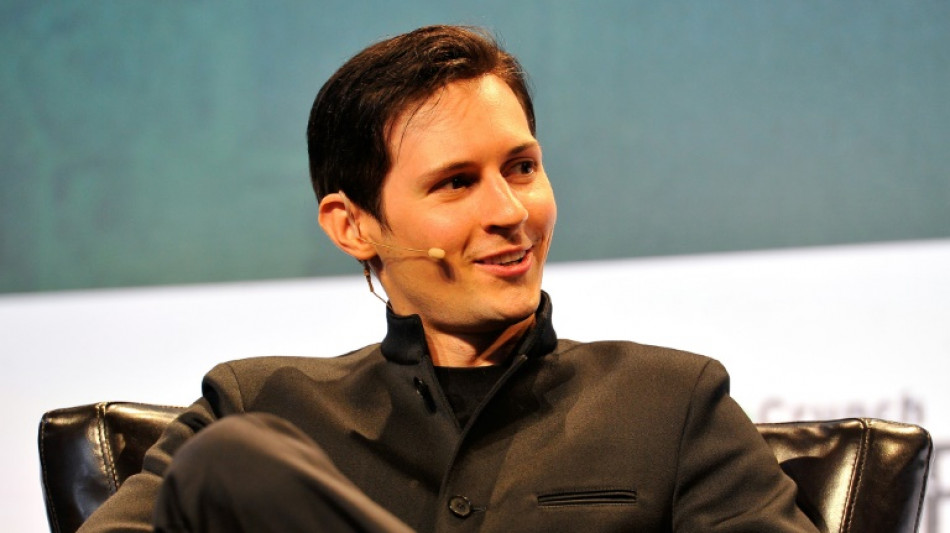
Telegram founder ordered to French court to face possible charges

Pavel Durov, the founder and chief of Telegram, was to appear in a French court Wednesday to face possible charges of failing to curb extremist and illegal content on the popular messaging app after his arrest at the weekend.
Russian-born Durov, 39, was arrested at Le Bourget airport outside Paris late Saturday.
After almost four days of questioning in detention by French investigators he was handed over to judicial authorities who will decide further measures, a source close to the case told AFP.
A Paris investigating magistrate will decide whether to press charges against Durov, and the judiciary would then rule on whether he will be remanded in custody or allowed to go free, possibly under judicial control with restrictions on his movements.
As part of a probe that was confidentially opened on July 8, Durov is being investigated on suspicion of 12 offences related to failing to curb extremist and criminal content on Telegram, sources close to the investigation have said.
The tech mogul founded Telegram as he was in the process of quitting his native Russia a decade ago. Its growth has been exponential, with the app now reporting over 900 million users.
An enigmatic figure who rarely speaks in public, Durov is a citizen of Russia, France and the United Arab Emirates, where Telegram is based.
Forbes magazine estimates his current fortune at $15.5 billion, though he proudly promotes the virtues of an ascetic life that includes ice baths and not drinking alcohol or coffee.
Numerous questions have been raised about the timing and circumstances of Durov's detention, with supporters seeing him as a freedom of speech champion and detractors as a menace who wilfully allowed Telegram to get out of control.
Le Monde newspaper reported Wednesday that Durov had met French President Emmanuel Macron on several occasions prior to receiving French nationality in 2021, via a special procedure reserved for those deemed to have made a special contribution to France.
The Wall Street Journal added that at one lunch in 2018, Macron -- who along with his team was in the past an avid user of Telegram -- had suggested it should be headquartered in Paris, but Durov refused.
The Canard Enchaine weekly newspaper said that when he was arrested Durov had claimed he was in Paris to dine with Macron, which the Elysee denied.
- 'In no way political' -
In a post on X to address what he called "false information" concerning the case, Macron said Durov's arrest was "in no way a political decision" and it was "up to the judges to rule".
In Moscow, Kremlin spokesman Dmitry Peskov said the charges were very serious and thus needed "no less serious evidence".
"Otherwise this would be a direct attempt to restrict freedom of communication, and, I might even say, directly intimidate the head of a large company," he said.
The UAE meanwhile said it was "closely following the case" and had requested consular access for him.
Among those voicing support for Durov is fellow tech tycoon and chief executive of X, Elon Musk, who has posted comments under the hashtag #FreePavel.
Durov left Russia a decade ago as he was setting up Telegram amid an ownership squabble concerning his first project, the Russian social network VKontakte.
But his departure from Russia was reportedly not an abrupt exile: according to the Vazhnye Istorii news site, citing leaked border data, he visited the country more than 50 times between 2015 and 2021.
- 'Nothing to hide' -
Durov, who has been based in Dubai in recent years, arrived in Paris from the Azerbaijani capital Baku and was planning to have dinner in the French capital, a source close to the case said.
France's OFMIN, an office tasked with preventing violence against minors, issued an arrest warrant for Durov in a preliminary investigation into alleged offences including fraud, drug trafficking, cyberbullying, organised crime and promotion of terrorism.
Telegram said in response that "Durov has nothing to hide and travels frequently in Europe".
It has also played a key role since Russia's invasion of Ukraine, used actively by politicians and commentators on both sides of the war.
But critics accuse it of hosting often illegal content ranging from extreme sexual imagery to disinformation and narcotics services.
T.Galgano--PV
